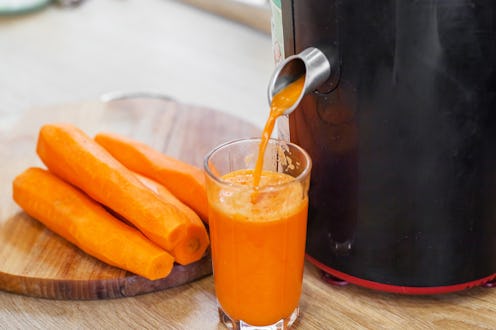Life
3 Powerful Juicers That Can Handle Carrots & Fibrous Veggies For The Most Nutritious Juices

Carrots are packed with healthy minerals and vitamins like calcium and vitamin A, but if you’re not using the right juicer, most of it can end up in the pulp bin rather than in your glass. The best juicers for carrots extract the most juice possible from this fibrous vegetable, leaving you with dry pulp and a full serving of fresh juice. Juicer research takes time, so here are a few things to keep in mind as you shop.
Since carrots are dense root vegetables, they can be challenging for many juicers to process. Some juicers jam or stall under the strain of hard items like beets and carrots, while others simply can’t extract juice from fibrous foods. Slow juicers (also called masticating juicers), work by crushing ingredients through a rotating auger that separates the fiber from the juice. They excel at juicing carrots and other hard foods, but some prep is required to get the best results.
Keep in mind that slow juicers are just that: slow. If you’re someone who wants to make juice quickly or in large volumes, you might prefer a centrifugal juicer. They work by grinding ingredients into a pulp and spinning quickly to separate it from the juice. Minimal prep is needed as they have large feed chutes, but the nutritional value can be compromised due to exposure to air.
No matter what style juicer you choose, you’ll find three of the best juicers for carrots below.
We only recommend products we love and that we think you will, too. We may receive a portion of sales from products purchased from this article, which was written by our Commerce team.
1The Best Juicer For Carrots: KOIOS Slow Juice Extractor
This slow juicer from KOIOS features an extra-long auger to extract juice from pulp, which gets ejected into an external bin. Juice streams into the provided tank, and since there is no valve, ingredients can be fed continually into the feed chute until you’ve reached your desired juice volume. The KOIOS has two speed settings, soft and hard, to ensure that ingredients like carrots are processed at the right speed to get the highest juice yield. The machine also features a reverse button, in the event that any ingredients get jammed while being juiced. Since the juicing process is slow and sealed, ingredients aren’t exposed to heat or excessive air, so your juice will be nutrient-dense and free of the foam that's commonplace when using centrifugal juicers. One note: While the size of the hopper isn't disclosed, reviewers noted that you'll have to cut your carrots into 2-inch pieces in order to juice them with this machine.
2The Most Affordable Slow Juicer: Mueller Austria Ultra Juicer Machine
Mueller’s slow juicer has a vertical design and a 3-inch wide ingredient hopper, so you can load carrots and other vegetables without having to continually feed it. Unlike the KOIOS, juice doesn’t automatically pour into the external juice container but instead goes into a holding tank of sorts that surrounds a fine mesh strainer. This allows you to see how much you’ve juiced before you open the no-drip spout to pour it into the included container (or directly into your glass). The Mueller has a single speed and a reverse button, and while some reviewers note that fibrous ingredients like carrots take longer to juice, the machine does a good job with them. Due to the low-heat, contained juicing process, juice will stay fresher and more nutritious for longer. According to the brand, it can extract as much as 60% more vitamin A from carrots compared to carrot juice made in a centrifugal juicer. At just shy of $90, the Mueller is a great alternative to the plethora of pricey slow juicers on the market.
3The Best Juicer For Large-Batches: Fochea Centrifugal Juicer
This centrifugal juicer from Fochea is a great option for making large volumes of carrot juice quickly. The large 2.5-inch feed chute can accept whole or minimally prepped fruits and vegetables, and an included pusher helps move ingredients down to a rotating grinding plate. Once ingredients are blended, juice streams out into the included pitcher, and pulp is sent into a large external bin. A variable speed dial allows you to select between two speeds, depending on the density of whatever you’re juicing. There's also a third setting you can use to shift ingredients if they get stuck. Soft fruits like tomatoes or citrus are best juiced on the slower setting, while hard foods such as carrots, beets, and apples should be juiced on the higher speed. The Fochea is a bargain at $41, and it's a good juicing solution for larger households, or for people who want to juice and drink their fresh produce quickly. Something to keep in mind? Since the high-speed grinding and spinning process exposes ingredients to air and heat, oxidation and nutrient-loss can occur quicker versus using a slow juicer.